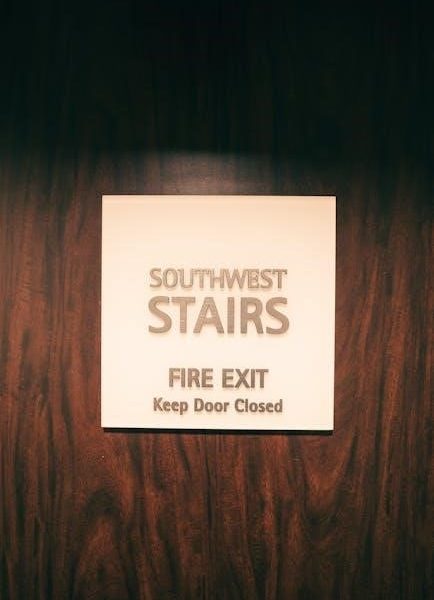The Hawaii Vaccine Exemption Form is a legal document enabling individuals to request exemptions from vaccination requirements due to medical, religious, or philosophical reasons, governed by state laws and administrative rules.
1.1 Overview of the Hawaii Vaccine Exemption Process
The Hawaii Vaccine Exemption Process allows individuals to legally opt out of vaccination requirements for medical, religious, or philosophical reasons. The process involves completing the Hawaii Vaccine Exemption Form PDF, which requires personal and medical information, and must be signed by the applicant, a parent (if applicable), and a healthcare provider. The form is submitted to the Hawaii Department of Health or the child’s school, with deadlines and processing times varying by jurisdiction. This process ensures compliance with state laws and administrative rules while respecting individual beliefs and health conditions.
1.2 Importance of the Exemption Form in Hawaii
The Hawaii Vaccine Exemption Form is crucial for individuals seeking to opt out of vaccination requirements due to medical, religious, or philosophical beliefs. It ensures a structured process for requesting exemptions, safeguarding personal rights while maintaining public health standards. The form provides a legal pathway for informed health decisions, allowing parents and individuals to align their choices with personal values or medical needs. By adhering to state laws, it balances individual freedoms with community health protections, making it a vital document for those navigating vaccination mandates in Hawaii.

Types of Vaccine Exemptions in Hawaii
Hawaii offers medical, religious, and philosophical exemptions, allowing individuals to opt out of vaccinations based on health conditions, faith, or personal beliefs, as per state regulations.
2.1 Medical Exemption
A medical exemption in Hawaii is granted when a licensed healthcare provider certifies that vaccination may endanger the individual’s health due to a medical condition. This exemption requires submission of a completed Medical Exemption Form, signed by both the individual (or parent) and the healthcare provider. The form must detail the medical reason for the exemption and is subject to review by the Hawaii Department of Health. It is typically valid for the duration of the medical condition and must comply with state regulations, such as Hawaii Administrative Rules 11-157-5.
2.2 Religious Exemption
A religious exemption in Hawaii allows individuals to opt out of vaccinations if immunization conflicts with their sincere religious beliefs. Applicants must complete the Religious Exemption Form, certifying that vaccination violates their faith. The form requires the individual’s signature and must be submitted to the relevant school or healthcare authority. Religious exemptions are recognized under Hawaii Revised Statutes and Administrative Rules, ensuring freedom of religious practice while maintaining public health standards. No additional documentation beyond the form is typically required for this exemption type.
2.3 Philosophical Exemption
Hawaii recognizes philosophical exemptions, allowing individuals to opt out of vaccinations based on personal, moral, or ethical beliefs. The process involves submitting the Hawaii Vaccine Exemption Form, which requires a statement outlining the philosophical reasons for exemption. This option is distinct from religious exemptions and is designed for those who object to vaccines for non-religious, personal reasons. The form must be completed accurately and signed, ensuring compliance with state regulations while respecting individual beliefs and values.

Legal Framework for Vaccine Exemptions in Hawaii
Hawaii’s vaccine exemptions are governed by Administrative Rules 11-157-5 and Revised Statutes 302A-1156, 302A-1157, and 325-0034, establishing criteria for medical, religious, and philosophical exemptions.
3.1 Hawaii Administrative Rules 11-157-5
Hawaii Administrative Rules 11-157-5 outline the legal criteria for vaccine exemptions, requiring individuals to submit formal documentation. Medical exemptions must be certified by a licensed healthcare provider, while religious exemptions demand a signed affidavit. These rules ensure compliance with state health regulations and provide a structured process for requesting exemptions. The form must be submitted to the Hawaii Department of Health, with specific instructions for completion and verification. This rule ensures exemptions are granted only under valid circumstances, maintaining public health standards while respecting individual rights.
3.2 Hawaii Revised Statutes (302A-1156, 302A-1157, 325-0034)
Hawaii Revised Statutes 302A-1156 and 302A-1157 govern health and education requirements, including vaccine exemptions for school attendees. Section 325-0034 specifically addresses immunization exemptions, allowing medical or religious exemptions with proper documentation. These statutes provide the legal foundation for vaccine exemption requests, ensuring compliance with state health laws while respecting individual rights. They outline the conditions under which exemptions may be granted and the responsibilities of both applicants and healthcare providers in the process. These laws are essential for maintaining public health while accommodating personal beliefs and medical needs.
3.3 Legislative Basis for Exemptions
The legislative basis for vaccine exemptions in Hawaii is rooted in specific statutes and administrative rules. Hawaii Revised Statutes 302A-1156 and 302A-1157 establish the framework for health and education requirements, while 325-0034 specifically addresses immunization exemptions. These laws provide the authority for individuals to request exemptions based on medical, religious, or philosophical grounds. The statutes ensure that exemptions are granted in a manner that balances public health concerns with individual rights, maintaining legal clarity and consistency in the exemption process across the state.

Steps to Apply for a Vaccine Exemption in Hawaii
The process to obtain a vaccine exemption in Hawaii involves several structured steps to ensure compliance with state laws and health regulations, including form submission, required signatures, and proper documentation to maintain public health standards.
4.1 Obtaining the Hawaii Vaccine Exemption Form PDF
The Hawaii Vaccine Exemption Form PDF can be easily obtained from the official Hawaii Department of Health website. The form, titled “Request for Exemption from Vaccination on Religious Grounds,” is available for download and printing. It is essential to ensure the form is downloaded from the official source to guarantee accuracy and compliance with state regulations. Once downloaded, the form must be filled out correctly and thoroughly, as incomplete or incorrect submissions may delay the exemption process.
4.2 Filling Out the Form
Filling out the Hawaii Vaccine Exemption Form requires careful attention to detail. The form typically includes sections for personal information, exemption type (medical, religious, or philosophical), and a declaration of understanding the risks of not vaccinating. For medical exemptions, a licensed healthcare provider must certify the medical reasoning. Religious or philosophical exemptions require a signed affidavit. Ensure all fields are completed accurately, and handwriting is legible. Incomplete forms may result in delays or denial of the exemption request. Refer to the Hawaii Department of Health website for specific instructions or additional guidance.
4.3 Required Signatures
The Hawaii Vaccine Exemption Form requires specific signatures to validate the request. For medical exemptions, a licensed healthcare provider must sign and certify the medical reasoning. Religious or philosophical exemptions require the individual’s or parent’s signature, affirming their beliefs. In cases involving minors, a parent or legal guardian must sign the form. All signatures must be notarized or witnessed by an authorized official. Missing or incomplete signatures may result in the form being rejected. Ensure all required parties sign the document to avoid processing delays.
4.4 Submission Process
The completed Hawaii Vaccine Exemption Form must be submitted to the Hawaii Department of Health, Immunization Branch. Applicants can mail the form to P.O. Box 3378, Honolulu, HI 96801, or fax it to (808) 586-8347. Ensure all required signatures and documentation are included. Keep a copy for personal records. The submission process is straightforward, but it’s essential to verify receipt and follow up if there are delays. Proper submission ensures the exemption request is reviewed promptly by the appropriate authorities.

Required Documentation for Exemption
Required documentation for vaccine exemption in Hawaii includes medical records, religious affidavits, and additional supporting papers to validate exemption requests effectively.
5.1 Medical Documentation for Exemption
The medical exemption requires a completed form signed by a licensed healthcare provider, detailing the medical reasons for exemption. The form must include the provider’s certification that vaccination poses a health risk. Submissions should be sent to the Hawaii Department of Health, either by mail to P.O. Box 3378, Honolulu, HI 96801, or via fax to (808) 586-8347. Incomplete forms will not be accepted, ensuring the process is thorough and compliant with state regulations. This step is crucial for validating medical exemptions in Hawaii.
5.2 Religious Affidavit
The religious exemption requires a signed affidavit from the individual or parent, stating that immunization conflicts with their sincere religious beliefs. This affidavit must be submitted alongside the Hawaii Vaccine Exemption Form. The form is available on the Hawaii Department of Health’s website and can be completed at the child’s school or healthcare provider’s office. No additional documentation is required beyond the affidavit, ensuring a streamlined process for those seeking exemptions based on religious grounds in Hawaii.
5.3 Additional Supporting Documents
Applicants may need to provide supplementary documents to strengthen their exemption request. For medical exemptions, letters from licensed healthcare providers detailing the medical rationale are essential. Religious exemptions may require evidence of religious affiliation or letters from religious leaders. Additional documents, such as philosophical statements or legal affidavits, can also be included to support the request. These materials help ensure the application is comprehensive and aligns with Hawaii’s legal requirements for vaccine exemptions, enhancing the likelihood of approval.

Submission Guidelines
Submit the completed Hawaii Vaccine Exemption Form to the Department of Health or designated schools. Ensure timely submission, aligned with enrollment deadlines, to avoid processing delays.
6.1 Where to Submit the Exemption Form
The completed Hawaii Vaccine Exemption Form must be submitted to the State of Hawaii Department of Health, Immunization Branch, at P.O. Box 3378, Honolulu, HI 96801, or faxed to (808) 586-8347. Additionally, forms can be submitted directly to the school or childcare facility requiring the exemption. Ensure the form is delivered to the appropriate authority to avoid delays in processing. This step is crucial for compliance with state immunization requirements and ensures timely approval of the exemption request.
6.2 Deadline for Submission
There is no fixed deadline for submitting the Hawaii Vaccine Exemption Form, but it is essential to file it in a timely manner, especially for school enrollment or travel purposes. For students, submission should occur well before the academic year begins to ensure processing and approval. For travelers, submit the form prior to booking or arranging plans to avoid delays. Late submissions may result in processing backlogs or complications. Always verify submission timelines with the specific institution or authority requiring the exemption to ensure compliance and avoid issues.
6.3 Processing Time
The processing time for the Hawaii Vaccine Exemption Form varies depending on the submission method and the authority’s workload. Typically, it can take several weeks for the form to be reviewed and approved. For school enrollment, it is advisable to submit the form well in advance to ensure timely processing. Processing times may be faster for electronic submissions compared to mail-in applications. Applicants are encouraged to follow up with the relevant department if there are delays or concerns about the status of their exemption request.
Benefits and Risks of Vaccine Exemptions
Vaccine exemptions in Hawaii allow individuals to opt out of vaccinations for personal or religious reasons, but they also pose risks of disease spread and public health concerns.
7.1 Understanding the Risks of Not Vaccinating
Not vaccinating increases susceptibility to preventable diseases, posing risks to individuals and public health. Unvaccinated individuals are more likely to contract and spread illnesses like measles, mumps, and whooping cough. This can lead to outbreaks, especially in communities with low vaccination rates. Vaccines protect not only the individual but also vulnerable populations, such as those with weakened immune systems. The risks of not vaccinating outweigh the benefits for most people, emphasizing the importance of careful consideration before seeking exemptions.
7.2 Benefits of Exemptions for Personal or Religious Reasons
Vaccine exemptions for personal or religious reasons respect individual beliefs and values, allowing families to make informed health decisions. They provide an alternative for those with deeply held convictions or philosophical objections to vaccinations. Exemptions ensure legal protections, enabling parents to align their choices with personal or religious principles while maintaining access to education and public spaces. This balance supports autonomy and diversity in public health policies, fostering trust in the system’s flexibility to accommodate differing perspectives.
Handling Denials of Exemption Requests
If an exemption request is denied, applicants can appeal the decision through formal channels or seek legal advice to address concerns and explore further options.

8.1 Appealing a Denied Exemption
If your exemption request is denied, you may appeal the decision through Hawaii’s administrative review process. Submit a formal appeal request, providing additional documentation or evidence to support your case. Ensure all paperwork is completed accurately and within the specified timeframe. Legal counsel may assist in navigating the appeal process. Understanding your rights and preparing a strong case is crucial for a successful outcome. proper documentation and adherence to guidelines are essential when challenging the denial of a vaccine exemption in Hawaii.
8.2 Legal Recourse for Denied Requests
If your vaccine exemption request is denied, you may pursue legal recourse by consulting an attorney specializing in health or administrative law. Review the denial reasons and gather evidence to support your case. Filing a lawsuit in Hawaii’s court system may be necessary to challenge the decision. Additionally, contacting support organizations or advocacy groups can provide guidance and resources to navigate the legal process effectively. Understanding your legal rights and options is crucial when facing a denied exemption request in Hawaii.
Additional Resources
The Hawaii Department of Health provides contact information, official websites, and support organizations to assist with vaccine exemption form submissions and related inquiries effectively.
9.1 Contact Information for State Health Department
For assistance with vaccine exemption forms, contact the Hawaii State Department of Health, Immunization Branch, at P.O. Box 3378, Honolulu, HI 96801. Fax submissions to (808) 586-8347 or call (808) 586-8332. For toll-free inquiries, dial 1 (800) 933-4832. Email inquiries can be sent to immunization@doh.hawaii.gov. These resources provide support for form submissions, document verification, and addressing exemption-related questions.
9.2 Links to Download the Exemption Form
The official Hawaii Vaccine Exemption Form PDF can be downloaded from the Hawaii Department of Health’s website at https://health.hawaii.gov/. Additionally, the form is available on the immunization branch’s webpage at https://immunization.doh.hawaii.gov/. For specific forms like the Religious Exemption Form, visit https://health.hawaii.gov/docd/files/2019/08/VaxToSchool_ParentNotice.pdf. Ensure to verify the authenticity of the source before downloading.
9.3 Support Organizations for Exemption Applicants
Several organizations provide support to individuals seeking vaccine exemptions in Hawaii. The Hawaii Department of Health offers guidance through its Immunization Branch, accessible at https://immunization.doh.hawaii.gov/. Additionally, non-profit groups like the National Vaccine Information Center (NVIC) offer resources and legal guidance for exemption applicants. For religious exemptions, faith-based organizations may provide templates or counseling. Legal aid services in Hawaii can also assist with navigating exemption processes. Contact the Hawaii Department of Health at (808) 586-8332 for further assistance.

The Hawaii Vaccine Exemption Form provides a structured pathway for individuals to opt out of vaccinations for medical, religious, or philosophical reasons, ensuring legal compliance and personal choice.
10.1 Final Thoughts on Vaccine Exemptions in Hawaii
The Hawaii Vaccine Exemption Form offers a balanced approach, respecting individual rights while safeguarding public health. It ensures compliance with state laws and provides clarity for those seeking exemptions due to medical, religious, or philosophical beliefs. By adhering to the legal framework, individuals can make informed decisions about vaccination, ensuring their personal choices align with state regulations. This process underscores the importance of vaccination while accommodating diverse perspectives, maintaining a fair and structured system for all residents.
10.2 Encouragement to Seek Professional Advice
Seeking professional advice is crucial when navigating the Hawaii Vaccine Exemption process. Consulting with healthcare providers ensures medical accuracy, while legal experts can clarify rights and responsibilities. Parents and individuals should engage with trusted professionals to understand the implications of exemptions, ensuring informed decisions align with personal beliefs and state regulations. Professional guidance helps avoid pitfalls, ensuring compliance and peace of mind throughout the process.

Frequently Asked Questions (FAQs)
Common questions about the Hawaii Vaccine Exemption Form include submission methods, required documents, processing times, and state-specific requirements, ensuring clarity for applicants seeking exemptions.

11.1 Can I Submit the Form Electronically?
The Hawaii Vaccine Exemption Form can be submitted electronically in some cases, but specific requirements apply. The form is typically available as a downloadable PDF, which can be filled out digitally. However, submission methods vary depending on the institution or authority. Some schools or healthcare providers may accept email submissions, while others require fax or mail. Checking with the relevant department or organization for their preferred method is recommended. The Hawaii Department of Health provides contact information for clarification on electronic submissions.
11.2 How Long Does the Exemption Process Take?
The processing time for the Hawaii Vaccine Exemption Form varies depending on the submission method and the authority reviewing it. Typically, electronic submissions are processed faster, while mail or fax submissions may take longer. The form must be complete, with all required signatures and documentation, to avoid delays. Processing times can range from a few days to several weeks. Applicants are advised to submit the form well in advance of any deadlines and to follow up with the relevant department if no response is received within a reasonable timeframe.
11.3 What if I Move to Another State?
If you move to another state after submitting a Hawaii Vaccine Exemption Form, the exemption will not automatically transfer, as vaccination requirements and exemption processes vary by state. You will need to research and comply with the new state’s laws and procedures. Some states may require you to reapply for an exemption or provide additional documentation. It is essential to consult with local health authorities or legal advisors in your new state to ensure compliance with their specific regulations. Planning ahead and understanding the requirements early can help avoid complications.


